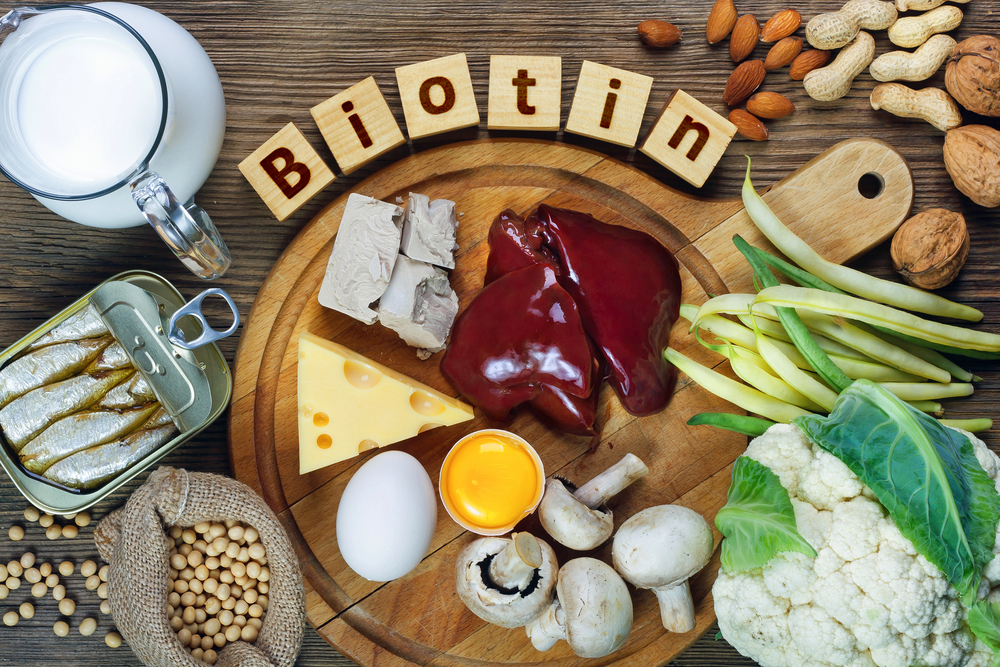Content
Biotin is a water-soluble vitamin that the body needs for normal metabolic processes in the body. Although biotin was discovered in 1927, it was recognized as a vitamin about 40 years later.
The role of biotin in the body is related to its function as a coenzyme in various biochemical reactions. It plays a key role in the metabolism of fatty acids, carbohydrates and amino acids. Biotin is essential for the processes of macronutrient synthesis and metabolism, as well as for maintaining skin, hair and nail health.
Biotin deficiency is a rare condition but can occur in some people with specific health problems or in people who resort to prolonged intake of antibiotics. Symptoms of biotin deficiency include skin problems such as itching, rashes and dry skin, hair loss and weak nails, and other nervous system problems such as mental fatigue and depression.
Testing of biotin levels can be done by a variety of methods, including blood tests and clinical studies. Sources of biotin include a variety of food products such as eggs, milk, fish, nuts and vegetables, as well as supplements that contain biotin.
What is biotin (vitamin B7)?
Biotin is also called vitamin B7. All living things need biotin to function, and some can produce biotin on their own-among them are some types of bacteria, yeast, molds, algae, and some plants.
There are several enzymes in the body that play a role in the process of biotin breakdown. Once biotin enters the body through food, it goes through a process of breakdown in the small intestine. There, biotin is broken down into smaller parts that can later be absorbed into the bloodstream.
In the bloodstream, biotin is transported to various tissues and organs in the body, where it plays its role in metabolic processes. It is important to note that the liver plays an important role in the retention and storage of biotin. It can store significant amounts of biotin, which is important for maintaining normal levels of this vitamin in the body.
What is the role of biotin (vitamin B7) in the body?
Biotin acts as a cofactor for five enzymes called carboxylases. These carboxylase enzymes are essential for metabolizing fatty acids, glucose (blood sugar), and amino acids. While these enzymes are found in all cells, carboxylases, which are involved in the metabolism of fatty acids, are found in large amounts in cells of the liver, white adipose tissue, mammary glands (breasts), heart, pancreas, and skeletal muscle. Biotin is required for the proper functioning of compounds called histones. Histones are a component of DNA in cells. Changes in histones can affect DNA function, including replication.
What causes biotin (vitamin B7) deficiency?
Biotin deficiency, also known as vitamin B7, is a rare condition but can occur in some specific situations. One of these is parental feeding, where babies are fed through intravenous solutions without biotin supplementation. Also, infant formulas that do not contain enough biotin can lead to deficiency.
Consumption of raw egg white can also lead to deficiency because it contains the substance avidin, which blocks the absorption of biotin. Cooking egg white destroys the avidin and prevents this effect.
There are other factors that can increase the risk of biotin deficiency. For example, chronic alcohol intake can reduce biotin levels in the body. Pregnant and breastfeeding women are also more prone to biotin deficiency. A genetic disorder called biotinidase deficiency is another cause of low biotin levels. This condition can lead to serious neurological and skin problems, including coma and death, but can be successfully controlled with lifelong biotin intake. Introducing these conditions in early childhood is standard practice to ensure timely treatment and prevent serious consequences.
Symptoms of Biotin (Vitamin B7) Deficiency
Symptoms of biotin deficiency can be varied and affect different systems in the body. They include:
- Thinning of the hair, which can lead to hair loss
- A red, scaly rash around the mouth, nose, eyes and perineum
- Conjunctivitis – inflammation of the outer surface of the eye.
- Seizures, which can manifest as muscle spasms.
- Skin infections due to disorders in the immune system.
- Brittle nails
- Depression
- Numbness in hands and feet
- Lethargy and a general feeling of tiredness and exhaustion.
Uneven distribution of facial fat, which can manifest as a rash in certain areas of the face.
Symptoms vary among infants. These may include lethargy, decreased muscle tone, and developmental delay. These symptoms are especially important for early detection of biotin deficiency in young children to prevent serious health problems and developmental disorders.
How to get biotin through the diet?
In order to get enough biotin through food, we can include foods rich in this vitamin in our diet. Here are some good sources of biotin:
- Eggs: Eggs are an excellent source of biotin. Eating whole eggs or just the whites can provide a significant amount of biotin.
- Fish and seafood: Cod, mackerel, sardines and other types of fish contain a significant amount of biotin.
- Meat: Beef, pork and chicken are also good sources of biotin.
- Oatmeal: Oatmeal is rich in biotin, especially if eaten in its natural form or as part of grain products.
- Nuts and seeds: Almonds, hazelnuts, Brazil nuts, peanuts, and sesame and flax seeds contain biotin.
- Milk and milk products: Cow’s milk, cheese, yogurt and other dairy products contain biotin.
Incorporating these foods into your diet can help ensure an adequate amount of biotin for your health.
Summary
Biotin is a key vitamin of the B-vitamin group that is essential for life. It plays an important role in the functioning of DNA and the metabolism of macronutrients, such as fats, carbohydrates and proteins. Measuring biotin levels in the body through a test can be helpful to ensure that you are not deficient in this important B vitamin. To prevent biotin deficiency it is important to know the food sources that are rich in this vitamin. In cases where you need to take supplements, it is important to consult a specialist.


